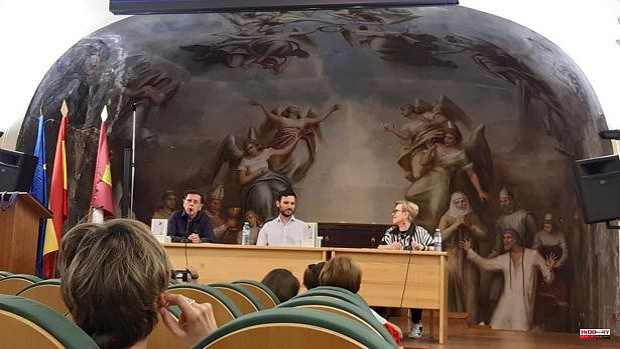This Thursday, May 26, the new collection of poems by the engineer from Toledo, who lives in Berlin, Santiago Galán Álvarez, was presented at the San Servando Castle in Toledo. The presentation of 'Arrival of oneself' (Almud editions of Castilla-La Mancha) has been carried out by the poet and writer María Antonia Ricas. Next, we reproduce the intervention of Ricas:
“We celebrate a book. Presenting it is always a joy for the creative power, for the word that he invents, and for the person who has written it, who brings it to the celebration, in this case Santiago Galán, exposing himself to the gazes, to the expectation, but also letting go of the time he held it when he wrote it. Presenting a book of poetry, on the other hand, talking about the impression as a reader, moving on to logical discourse, let's say, the subjective intensity that said reading produces, entails its difficulty because reading poetry, at least in my opinion, is to enter the of reason with inexplicable motives, is to let language soak up that side where definitions are superfluous. Borges's words are timely: I have a quote from Saint Augustine that I think fits perfectly.
Saint Augustine said: “What is time. If you don't ask me what it is, I know. If you ask me what it is, I don't know." I think the same about poetry.
We always know why we like a painting or we like a text or we like a panorama; the predicament lies in naming it, in trying to communicate it; something is lost, then, from that momentary trance of strength or beauty that we have felt. Olvido García Valdés said, in a pleasant and delicious poetic evening, a few weeks ago, something like that he was not interested in communicating when he wrote poetry... That interest, or disinterest, reflects the insightful understanding of what he considers the poetic fact, since it is about expression, of necessity and of naming things for the first time... and of opening up, later, to the reading vibration, that special shudder, Borges says again...
I already walked, at the time, with 'La lucidez del dromedario', also published, like the one we are dealing with, with the care of Alfonso González-Calero, in Almud, editions of Castilla-La Mancha…. And well, the linguistic correctness, the knowledge of the poetic substance and the necessary sensitivity optimally structured the book.
But, alas!, 'Arrival of oneself' is a formidable leap, a risk of literary height.
There is no fracture that breaks the thread with 'La lucidez del dromedario', there is no disruption –I use the term intentionally, it is fashionable, I use it before it becomes demodé–, but an ascending poetic flow, going upstream, to the source, cardinally.
In the development of his poems, a fine-tuned sense is appreciated that seeks the essential, find the root of the word, suggest more than say directly, rather than move in the simplicity of 'this is what I feel'. The poet is not interested either in communicating the experience that the poem could provoke but rather in creating the experience of language, the foundation of what I consider poetry, since the circumstance originates from language or, in other words, poetry does not dwell in that. what is counted but how it is counted. Santiago has achieved, with a calm, careful expression, with wise and at the same time precise restraint – even his silences, his punctuation omissions, for example, are significant – the emotion of naming for the first time, as I said before and that is, fair, which is moving when reading undoubted poetry like his.
Corredor Matheos, one of my favorites, says: The poet, then, forgets everything he knows on a conscious level and it would be said that he recovers his original innocence. Poetry, in a certain sense, is a lesson in ignorance... Of course, it does not refer to the ignorance of childishness, to the hollow innocence of ignorance, but to the original gaze and the apparent simplicity to make present what awaits be invented with language. Thus Santiago Galán in 'Arrival of oneself', thus his discovery.
I admire his sharp perception that places everything around him, time in the instant, confessional intimacy with a touch of melancholy, the lost, nature, not hostile, although inexpressible, the strangeness of not succumbing to constant stimuli and outsiders, to stay alive, yes, the strangeness of living... as I said, he situates all of this in the refined quality of an elegant style, without falling into the sappy selfishness, without approaching even a millimeter to that poetry of fine plastic, witty, easy by chance, which confuses clarity with the lack of resources to achieve the aptitude of amazement.
The poems of 'Arrival of oneself' start from detail towards transcendence and although the poet says: aspire to the unique/ to be piled up/ in the diverse, well, indeed, we have always wanted to be unmatched and what we have reached, or I have arrived – that I am speaking with a voice – is to have similar ailments to those of the neighbor, he also writes a core verse and that, I think, refers to the interpretation of the title: Growing up is realizing… What an accurate statement! To grow, to become aware of being sensitive, to be a presence and to witness what surrounds one's own space and, at the same time, learn to recount, take what has been lived out of chance, declare it, order it in memory, order it and take care of it.
Arrival of oneself… Where? Does it matter to know? Only by reading the book can one understand the direction of the book, its happening. Perhaps it is more important to verify that it arrives, that is, it has been read, that the person who writes behind me, by Santiago Galán, gives us this extraordinary reading opportunity, that of arriving ourselves… The gift of making the book ours when we we read, the other foundation of true poetry, the only one.
Federico Gallego Ripoll, so beloved, so intuitive, with that magical eye that characterizes his poetic wisdom, comments: I always look for a surprise in a book that overcomes custom.
So I thank this excellent author for the surprise of his new publication. I wish that his arrival has a long journey, in the manner of the extraordinary poem by Cavafis ».












